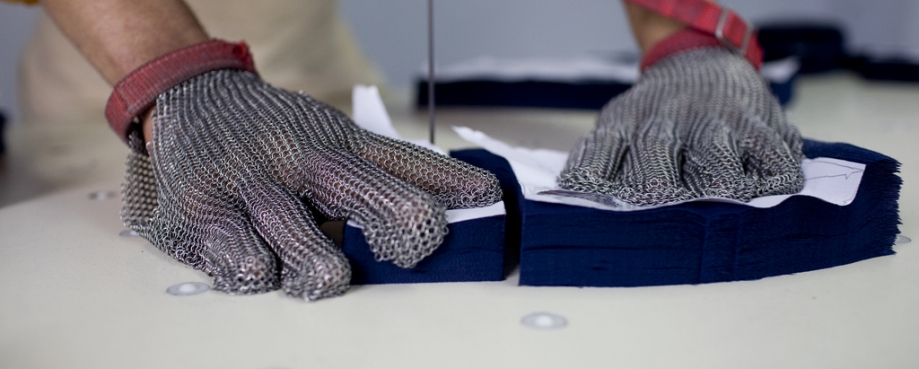
ETI has launched a programme to support the sustainable development of Leicester’s garment and textile industry. The programme seeks to address concerns that have been raised in a report on the sector, published today.
Our programme tackles issues raised in a report commissioned by ETI and produced by the University of Leicester’s Centre for Sustainable Work and Employment Futures. The report found issues in Leicester’s textile sector with workers being paid below the national minimum wage, absence of employment contracts, breaches in health and safety practices and poor enforcement of regulation and labour standards.
Debbie Coulter, ETI Head of Programmes, said: “Leicester is an important manufacturing centre for many fashion brands and retailers and is part of a re-emergence in UK textiles manufacturing. We know there are good business practices within some parts of the sector, but this research has also found evidence of serious and endemic labour rights issues. No worker should be paid below the national minimum wage, or work in precarious conditions where they are at risk of exploitation. These are serious issues that need to be addressed with urgency, if this sector is going to thrive and prosper.”
Our programme will tackle systemic issues linked to low wages in the sector through a number of measures. This will include training and support for suppliers and manufacturers, helping them build robust management systems and to ensure that wages meet legal requirements, as a minimum. ETI will also work with trade unions, local groups and regional networks, collectively tackling the issue of in-work poverty.
Ethical purchasing is another core focus. We will continue to promote good purchasing practices amongst brands and retailers, recognising the impact this can have on local industry practices. Building strong business relationships with suppliers and factories is also essential, as this can help them increase capacity and productivity. The focus is on building a fair trading environment, where responsible Leicester-based suppliers and manufacturers benefit through stronger relationships, longer-term investment and competitive advantage.
The programme will also help local industry gain better access to information on good employment and human resource processes, linking with other trade bodies and organisations. ETI will work with local groups to provide information and support for workers, and promote effective grievance mechanisms so that workers can raise concerns.
Andy York, Ethical Trading Manager at N Brown Group Plc said: "As a large retail group, N Brown Group Plc strongly believes in and supports the growth of the UK manufacturing sector. However this growth needs to be in line with all ethical and legal practices; these cannot be compromised. ETI has developed a credible plan for addressing working conditions within some parts of Leicester’s textiles sector, working with a wide range of stakeholders. N Brown is fully supportive of this collective effort, and is actively involved in the programme.”
Report author Dr Nik Hammer, Lecturer in Employment Studies at the University of Leicester, said: “Our research set out to understand supply chain dynamics within the UK garment sector, with a case study on working conditions in Leicester’s garment sector. Drawing on case studies and interviews with brands, retailers, trade unions, community groups and workers, the report offers in-depth insights into the problems the sector is facing as well as underlining the opportunities for growth and development. ETI’s programme outlines how it will work with brands, trade unions, NGOs, suppliers, manufacturers and other stakeholders to tackle the labour rights issues identified in the research. The University of Leicester, and its Centre for Sustainable Work and Employment Futures, are committed to supporting this programme wherever we can.”
Beverley Bambrough, Education and Equalities Director at the Community trade union, said: “These serious concerns around working practices within Leicester’s garment industry should provide renewed motivation for brands and retailers to ensure that workers in their suppliers not only have their legal rights upheld, but are also treated with fairness and respect. It may take some time to address some of the issues raised in today’s report but nobody should doubt the urgent need for action.
“Community has already begun to work with some of the brands to put in place practical action to improve working practices within UK suppliers. Ongoing trade union involvement in the ETI programme and other initiatives will remain important to ensure that there is enforcement and that workers are clear where they can seek independent support. Community will play its part in this programme and stands ready to work with ETI, any brand or retailer and other stakeholders to ensure that wages and conditions for UK garment and textile workers improve.”
Peter Williams, Advisor at Homeworkers Worldwide, said: "We welcome the commitment to tackling violations of rights of workers, most whom are women, in the garment sector in the UK, as well as elsewhere."
Debbie Coulter, ETI Head of Programmes, said: “We strongly support continued growth within Leicester’s garment and textiles sector. But this needs to be based on working conditions that, at the very least, meet the legal minimum. We’re pleased to be leading this programme, which brings together responsible brands and retailers, trade unions, NGOs and other stakeholders with a vested interest in Leicester. This group is committed to doing what is within its power to help strengthen the sector, but we will need the support of all stakeholders in order to realise the change that needs to take place.”
The report, ‘A New Industry on a Skewed Playing Field: Supply Chain Relations and Working Conditions in UK Garment Manufacturing’, can be found here on the University of Leicester website.
